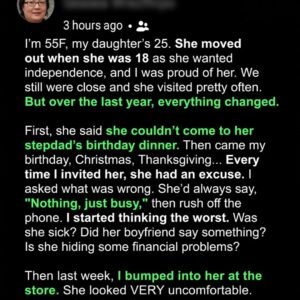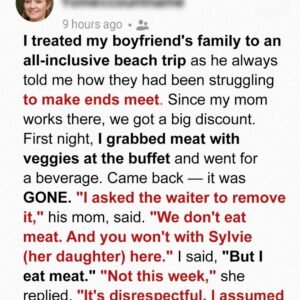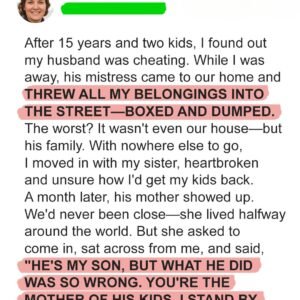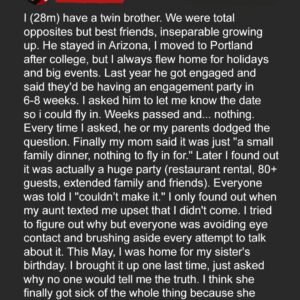Parents are supposed to protect their children from the world, not throw them in front of it like a shield. Mine never got that memo. For as long as I can remember, my parents treated money like a game of roulette—spinning it fast, losing it faster, and acting shocked every time the ball landed on red instead of black. I thought the worst of it was the power shut-offs and eviction notices that became the soundtrack of my childhood. But nothing compared to what I found out at twenty-nine: they had stolen my identity and buried me in debt.
I’d worked myself to the bone to dig out of my own financial hole. An unexpected surgery years earlier left me drowning in medical bills, but I picked up overtime shifts, cut vacations, and skipped luxuries to crawl my way back. This year’s tax refund was supposed to be my final payment toward freedom. Instead, a thick courthouse envelope landed on my kitchen table and turned my world upside down.
The letter said funds had been seized to settle outstanding debts under my name. Debts I’d never opened. At first, I thought it was a mistake. Then I called my parents.
My voice shook as I demanded an explanation. My mother’s reply was flat, like she was reading off a grocery list: “Yes, we used your name for one bill. Stop being so dramatic. You’re my daughter—it’s your job to help the family.”
I nearly dropped the phone. “You stole my identity? I’ve been paying off my own medical debt while you—”
My father’s voice cut in, shouting from the background. “Oh, please. We kept a roof over your head for years. Covering a few bills is the least you can do. You act like you’re some saint.”
A roof? Evictions, fights over money, me doing homework by candlelight while they screamed in the next room—that was their idea of shelter. I hung up before I said something I couldn’t take back. Instead, I opened my laptop and pulled up court records. There it was in black and white: a lawsuit filed in my name a year earlier. Every notice had gone to their address. Every receipt had my mother’s signature. They hadn’t just stolen from me—they’d hidden it for an entire year.
When I confronted them again, my mom snapped, “Stop playing the victim. We sacrificed everything for you. You think you’re better than us because you work a desk job?”
That’s when my sister chimed in, her voice laced with venom. “Wow, selfish much? Everyone helps the family except you. Maybe if you weren’t so high and mighty, Mom wouldn’t have had to do this.”
I lost it. “Helps the family? I’ve been drowning in medical debt while you forged my name and tanked my credit. And I’m the selfish one?”
My mother’s response was colder than ice. “If you think you’re dragging us to court, remember who brought you into this world.”
That wasn’t guilt-tripping. That was a threat. I hung up and called my friend Eli, a corporate lawyer. “I think my parents just made me your next case,” I whispered.
By morning, he had a plan. Within two days, we filed a police report for identity theft, a motion to dispute the debt, and a subpoena for the mail records showing exactly who had signed my court notices. When I told my mother, she laughed. “Sweetie, family doesn’t drag family through the mud.”
“You already dragged me there,” I shot back. For the first time, she didn’t have a comeback.
When the papers were served, the screaming started. My mother shrieked down the line, calling me a traitor, while my father insisted I’d “come crawling back when no one else cared.” But the truth was clear: I had already built a life without their chaos. And now, I finally had proof.
Eli uncovered the smoking gun—documents with my mother’s handwriting plastered across them. He also discovered the contracts never should have been approved in the first place; my parents’ credit was so abysmal, no company would’ve touched them. With that evidence, the debt was wiped from my record. My paycheck was safe again. My tax refund was gone, but my future wasn’t. My parents, however, faced charges of fraud and identity theft.
That didn’t stop the guilt trips. My sister called to accuse me of being “ungrateful” after everything my parents had done. My father even sent me a handwritten invoice for “raising expenses” like I owed them backpay for existing. It was so absurd, I laughed until my stomach hurt. Then I blocked them all.
I expected guilt to creep in eventually. But it never did. What I felt was relief, like someone had finally cut the anchor I’d been dragging since childhood. They didn’t just steal money from me—they stole trust. And you can rebuild money, but trust? Once it’s gone, it’s gone.
The last time my mom managed to get through, she hissed, “One day you’ll regret this. Family is all you have.”
I didn’t hesitate. “No,” I said. “Family is earned.” Then I hung up for the last time.
The revenge wasn’t in the courtroom or the cleared debt. The real revenge was freedom—the freedom to finally live my life without being chained to their mistakes. For the first time, their chaos wasn’t my problem anymore.





